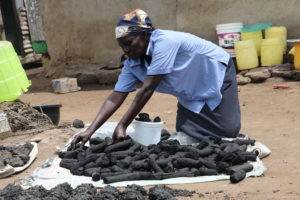The coronavirus crisis has drawn the world’s attention to the importance of universal healthcare. It’s also shown that the current patchy provision of essential services, such as clean water, sanitation and energy, can no longer be ignored.
The governments of countries in East Africa, where I’m based, are attempting to ‘flatten the curve’ by advising people to stay at home and follow strict social distancing rules. It’s advice that’s difficult to follow for people living in city slums and isolated rural areas. In these environments, most people’s livelihoods rely on work that earns a daily income. With that daily income, they buy the day’s food and other necessities for their household. There are no savings to fall back on. No option to ‘stock up’ on essentials. People are forced to leave their homes daily, exposing themselves and their family to the disease just to survive.

Collection of traditional fuel in East Africa
Fuel and school
When it comes to cooking and lighting their homes, people living in these poorer communities are likely to rely on traditional fuels, such as wood, charcoal and kerosene. Getting hold of these fuels will become more time consuming and expensive as the crisis unfolds. This won’t just cause problems for individual households. Energy plays a crucial role in the delivery of health services, education, water and sanitation.
With this in mind, social distancing measures, as important as they are, may be almost impossible to achieve in some areas. How can a family be expected to stay at home indefinitely without electricity or any connection to the outside world for information? Many schools are now teaching pupils through online platforms, allowing them to learn from the safety of their homes. But these innovative approaches exclude children living in off-grid areas and in slums, where electricity access is limited. How do these communities keep their children engaged in school activities without electricity to connect kids to the outside world through radios, televisions or computers?
Space to breathe
Breathing in smoke from indoor fires and fumes from kerosene lamps damages lungs. Exposure to smoke from cooking fires alone causes almost four million premature deaths each year, mostly women and children. People whose lungs are already damaged in this way are more likely to get more seriously ill if they develop COVID-19.
If they do fall ill, the healthcare available is likely to be poor. According to the World Health Organization, one in four health facilities in Africa has no access to electricity and only 28% of health facilities and 34% of hospitals have what could be called “reliable” access to electricity.
Health clinic in Malawi
Read more about clean cooking solutions in the face of coronavirus.
Clean energy
Governments and development organisations must prioritise energy access as part of their response to this pandemic. Powering health services and promoting clean cooking alternatives are two of the most powerful ways we can help people fight the virus. In terms of behaviour change, let’s focus not just on the importance of handwashing, but also on the benefit of clean fuels in keeping people healthy.
Solar home systems, clean cook stoves and mini-grids powered by renewable energy provide ‘quick wins’ when it comes to getting sustainable, clean energy to people who need it. They are generally cost-effective and, by reducing deforestation and carbon emissions, a climate friendly option too. At Practical Action, we’ve been helping vulnerable communities access these simple, innovative solutions for five decades.
Boosting recovery
Energy access will continue to be crucial in the aftermath of the pandemic, as governments focus on economic recovery. Electricity opens up new opportunities for businesses, increasing employment and boosting the local economy. It will be key to helping people lift themselves out of the inevitable economic downturn. Increased access to electricity should be accompanied by digital learning programmes. These will help entrepreneurs, teachers and community leaders support their communities through the recovery phase.
In Kenya, people are calling on water and electricity companies to waive their fees during the tough economic times ahead. We’d like to see governments supporting suppliers of sustainable energy so they can continue to provide an affordable service to poor and vulnerable communities in rural areas and slums.
Warning signs
With the support of our partners and donors, we’ve helped thousands of people access electricity and clean cooking solutions. We need to make sure these gains aren’t compromised during this crisis. The warning signs are already there. The Kenya 2020 Tax Amendments Bill proposes reintroduction of a tax on liquified petroleum gas, cook stoves and solar home systems. It’s a tax we worked hard to stamp out in the past. If it’s reintroduced, it will lead to an immediate increase in the price of exactly the essential energy products that will help vulnerable communities cope with, and recover from, the current crisis.
From improving health and educating the next generation to boosting economic recovery, the importance of electricity and clean cooking has never been clearer.
Find out more about our work transforming lives through access to clean, affordable energy.